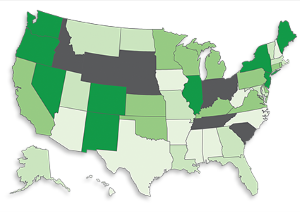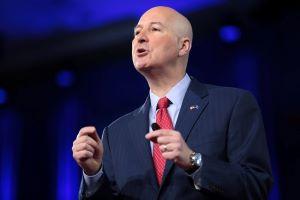The nation's most venerable marijuana legalization group, the National Organization for the Reform of Marijuana Laws (NORML), has just issued its 2020 Gubernatorial Scorecard grading the nation's governors on their level of support for ending marijuana prohibition. Thanks to NORML, we can now identify those chief executives whose stances on cannabis remain mired in the last century.

Getting marijuana reforms, whether its medical marijuana or adult legalization, through state legislatures is a tough, grinding slog, and the position of the governor can make or break a bill. Although, as governors such as Democrats Phil Murphy in New Jersey and Andrew Cuomo in New York found out last year, even the governor's support can't guarantee a measure gets passed.
As NORML executive director Eric Altieri noted in releasing the report, "Most legislative activity specific to marijuana policy takes place at the state level and America's governors are our nation's most powerful state-elected officials. These 50 lawmakers play a key role in whether or not marijuana policy reform advances at the state level so it is vitally important that reformers are aware of where they stand on the issue."
Here are the ones that stand farthest to the right. All eight of these Republican governors earned a big, fat "F" from NORML:
Idaho Gov. Brad Little. While he neither enacted nor vetoed marijuana-related legislation last year, he has opposed any loosening of pot prohibition, including even industrial hemp and medical marijuana. His position is best summed up by this quote from April 2019: If Idahoans wanted to legalize marijuana, "they elected the wrong guy as governor."
Indiana Gov. Eric Holcomb. With marijuana bills unable to get anywhere in the GOP-dominated legislature, Holcomb has not had to sign or veto any measures, but he has historically opposed even medical marijuana, not to mention adult legalization. Now, he's using federal pot prohibition as a shield for his recalcitrance, saying that he will continue to oppose and marijuana reforms as long as the federal ban remains. He also said in 2019 that, "Right now, it's a crime. I'm just simply not willing to look the other way," even though he could act to make it not a crime and even though he is apparently willing to look the other way on his own self-admitted college toking.

Ohio Gov. Mike DeWine. DeWine has long been a reefer recalcitrant and spoken consistently about his opposition to recreational marijuana legalization. Even though neighboring Michigan has flipped and neighboring Pennsylvania could this year, he still sides with his fellow prohibitionist GOP governor in neighboring Indiana. "It would really be a mistake for Ohio, by legislation, to say that marijuana for adults is just okay," he said just last month.
South Carolina Gov. Henry McMaster. Long an opponent of recreational marijuana legalization, McMaster has also opposed medical marijuana when pressed. In his most recent comments on the issue, when asked about supporting medical marijuana, he said, "No. Law enforcement officials have made it clear that we are not in a position to appropriately regulate medical marijuana."

Tennessee Gov. Bill Lee. The state passed an extremely limited CBD possession law in 2014, and the only interest he has in any further marijuana reforms is expanding on that. He hasn't gotten behind broader medical marijuana, and he's even against decriminalization, not to mention legalization. "I have said before and still believe that we should not decriminalize marijuana... I think that's not good for our state," he said in March 2019.
Wyoming Gov. Mark Gordon. Gordon is foe of adult legalization and a skeptic on medical marijuana. "I am not in favor of legalizing marijuana," he said as a gubernatorial candidate in 2018."There is maybe some discussion that can be had about medical marijuana, but I am not particularity in favor of doing that until we've had a very full conversation about what that means. So I am not in favor really of legalizing that. My understanding is that there are some alternatives that are prescription based. So the dosage is known, the purity is known, and we're taking risks for our patients." He didn't say anything last year to indicate his position has become more enlightened.
(This article was prepared by StoptheDrugWar.org's 501(c)(4) lobbying nonprofit, the Drug Reform Coordination Network, which also pays the cost of maintaining this website. DRCNet Foundation takes no positions on candidates for public office, in compliance with section 501(c)(3) of the Internal Revenue Code and does not pay for reporting that could be interpreted or misinterpreted as doing so.)
This work by StoptheDrugWar.org is licensed under Creative Commons Attribution-ShareAlike 4.0 International
Add new comment